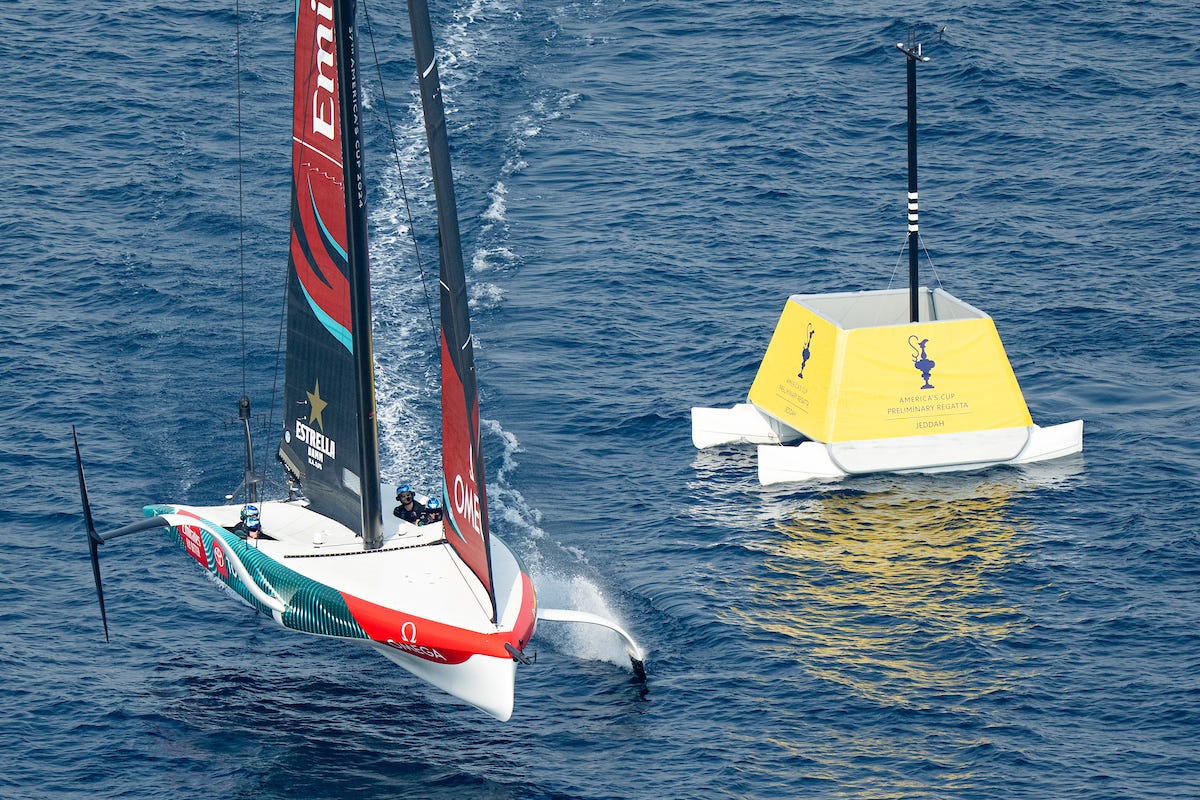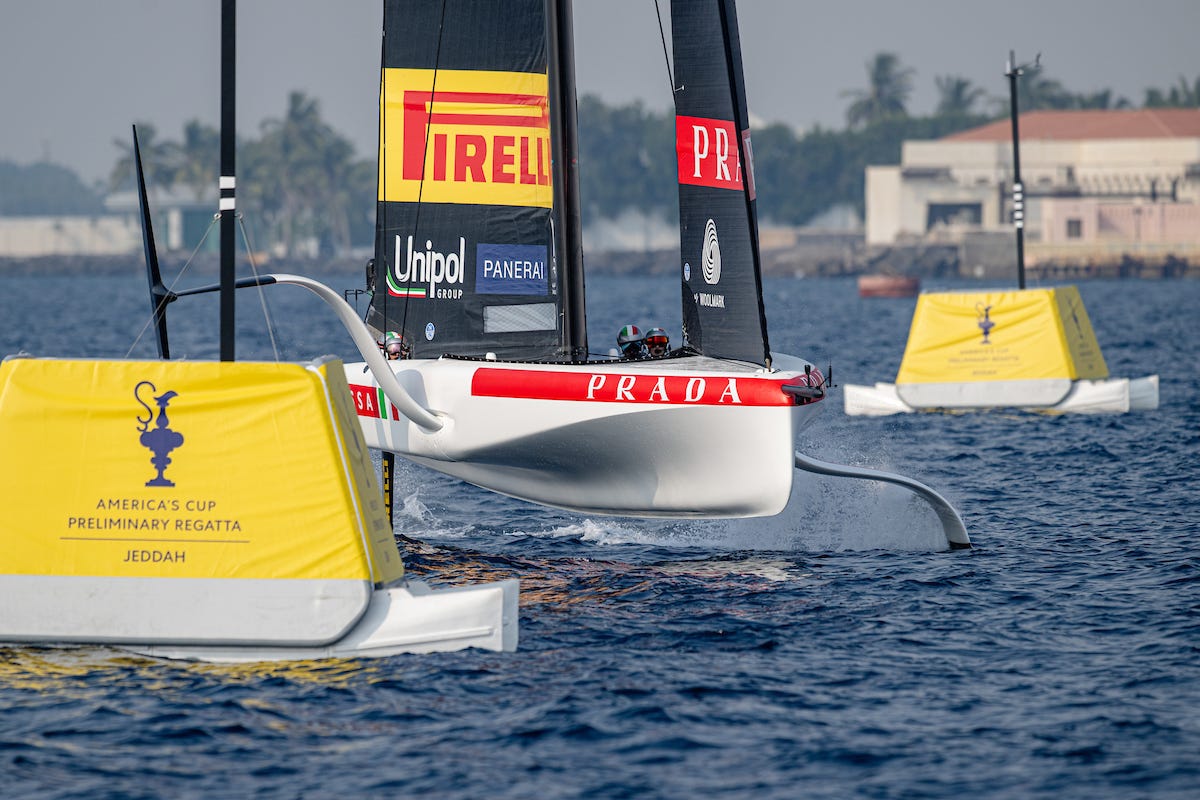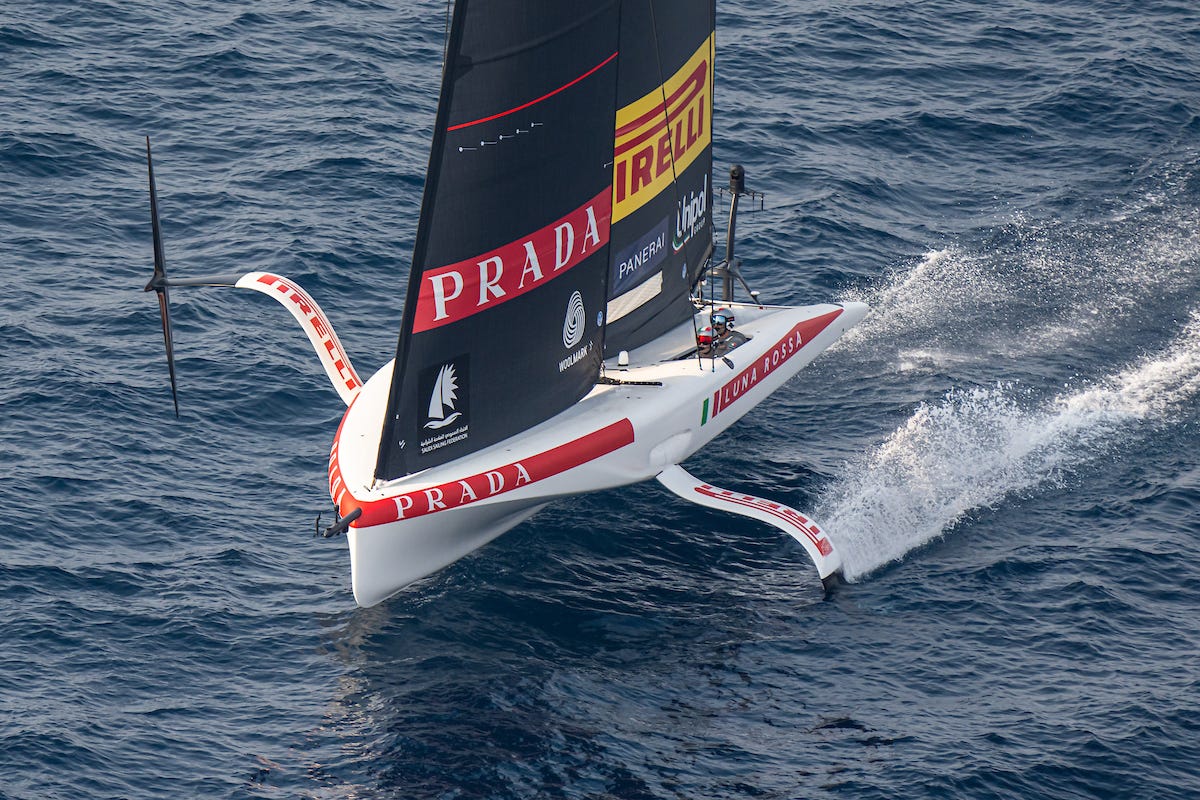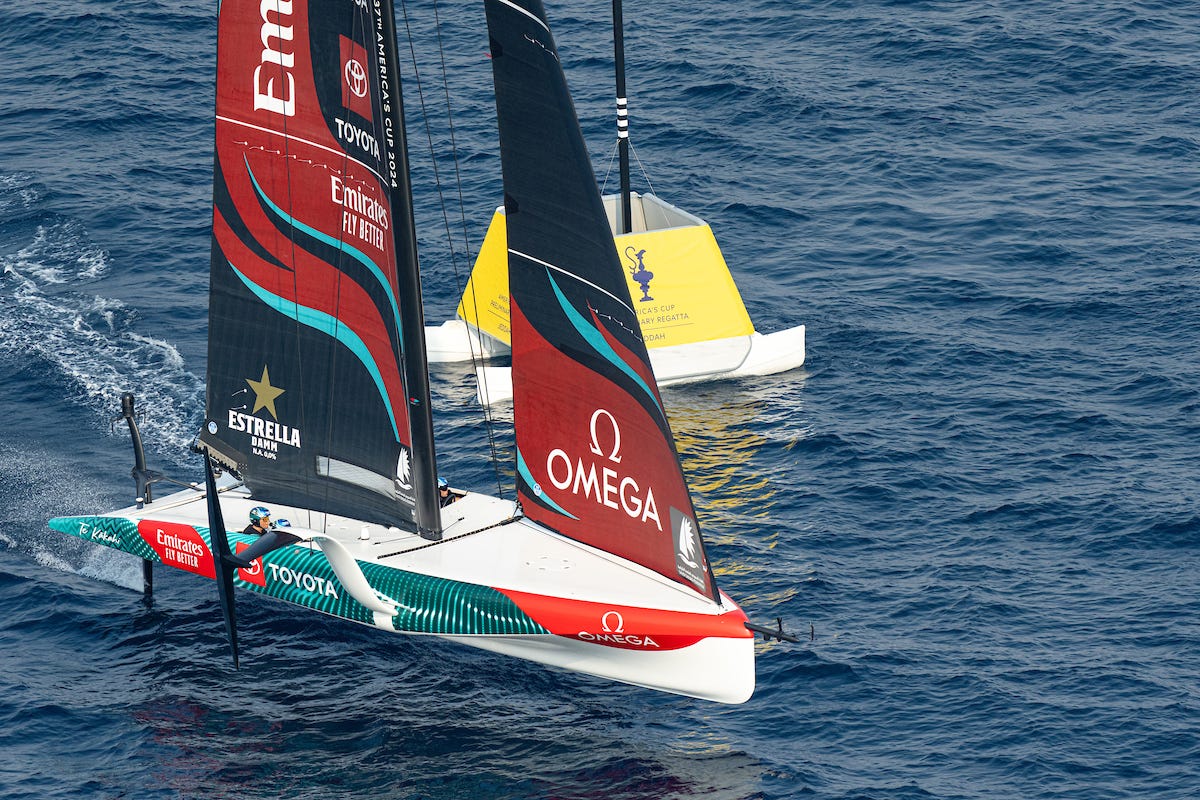Kiwis excel as Italian young guns impress
Emirates Team New Zealand tops the standings at the end of the opening day of the America's Cup prelim regatta in Jeddah with Luna Rossa Prada Pirelli and Alinghi Red Bull Racing making up the podium
Aside from the race committee – who managed to put three races on the board on what was reputedly the lightest wind day of the three-day event – it is the America’s Cup holders Emirates Team New Zealand who will be the happiest group in Jeddah tonight, having chalked up a 1,1,5 scoreline that sees them top the standings at the end of the first day.
That said, the mood in the Luna Rossa Prada Pirelli Team hotel will be far from glum after an unexpected performance from the Italian crew – led by the young gun helming duo Ruggero Tita and Marco Gradoni – saw them end a day on which consistency was at a premium with a 3,4,1 results string that puts them in second place overall, two points adrift of the Kiwis.
Also likely to be all smiles over dinner tonight are the Swiss Alinghi Red Bull Racing sailors – led by helmsmen Arnaud Psarofaghis and Maxime Bachelin – whose 4,2,3 scoreline sees them sitting in third place, tied on points with Ben Ainslie and Giles Scott’s British INEOS Britannia syndicate who racked up a 2,3,4 string.
Hoping for a better day tomorrow will be the NYYC American Magic crew whose startline woes from yesterday’s practice racing came back to haunt them again today.
The US team dropped off the foils in the final minutes before the starts in two out of three races and were OCS in the other. After clocking a DSQ for a blatant boundary penalty as they tried to get foiling in the first race, they then scored a DNS in the third heat after not being able to start within the (three minute, I believe) time limit.
Meanwhile, Quentin Delapierre and Kevin Pepponet’s French Orient Express Racing Team will be looking to improve on a 5,5,2 score that puts them in fifth ahead of the Americans tonight.
Fearless young guns prove their worth
Luna Rossa’s Ruggero Tita told me after racing that he and Marco Gradoni only found out they would be helming the Italian AC40 after landing in Jeddah last week.
Despite the late call up Tita – the reigning Nacra 17 Olympic champion – showed few nerves in front of the international media at yesterday’s press conference, or facing the more experienced helming duos on the water today.
“It’s a very big thing for us,” Tita confessed, with a smile. “We had some training in Barcelona and here we did six or seven days on the boat. That’s not that much but it’s enough to be able to compete here this week.”
Tita said the team had not specifically targeted a race win as part of their plan for the regatta but seemed not overly surprised to have delivered a comprehensive one in the third race of the opening day.
“It’s part of the game and we are going to try in every race to win,” he said. “We know that our hours on the boat are less than all our competitors – so being here and being able to take home a win means our learning curve is steep and is going high.”
The Italian helmsman confirmed what his opposite number on the Emirates Team New Zealand AC40 Peter Burling – winner of the day’s first two races – told me about the importance of a clean start in such light air conditions (the breeze never got close to double figures all day).
“When you start in front and you have a clear lane and you are able to go faster and be more confident to pull off manoeuvres,” Tita said. “That’s what we did in the last race. As soon as you stretch a bit and are free to sail your own lane the distance gets further and further.”
So how did they manage to execute their race three winning start?
“We went for a port start – the same strategy as we tried in the second race but then we didn’t make it. This time we plotted out our circle to arrive at the start line on time and we hit all our points on time and were able to make a good start.”
Tita was keen to highlight the importance of the when and where the Luna Rossa AC40 was towed on to its foils by the team chase boat.
“The timing and the positioning of the point where you start towing is really important. It is also important to have a really powerful rib too to be able to get up easily.”
Just glad to be here
INEOS Britannia skipper Ben Ainslie talked me through the last minute technical issues the British team had to deal with this morning that almost meant them not being able to race.
“Well we have been struggling for a long time – not just here with our starboard foil flap on the boat, which kept jamming. Actually, a big shout out to Kiwis who have helped us tremendously.
“They came on yesterday and helped us make some changes, but this morning we discovered we had a hydraulic oil leak. That meant we needed to make some more serious changes, and all of this was really last minute.
“It was really pushing it to get that new ram in time to allow us to make the first race. The shore crew guys did a great job – and again thanks to the Kiwis for helping us out with that.
“So it wasn't the ideal start today – but at least we got to the race course and in the end we did OK.”
It’s all in the nuances
It’s hard not to marvel at the New Zealand team’s performance in the first two races of the day when they seemed to have built an almost unassailable lead by the time they reached the first windward gate.
Having tried and failed to get the inscrutable Peter Burling to give me a clue as to what the Kiwi crew are doing differently to all the other teams – his answer centred around the team that sniffed out the breeze best would end up on top – I asked INEOS Britannia helmsman Ben Ainslie what he thought.
“I think it’s like any other boat – it's all in the nuances,” Ainslie told me.
“It's like going up against a top Laser sailor who's just really on his game and has had a little bit more time in the boat than you. In the AC40 those differences are that much bigger because of the speeds of the boat.
“Also in these lighter breezes you get out in front in clear air – like they did – and you're sailing the boat well like they are, then you are gone.
“I think they are sailing the boat exceptionally well – better than the other teams. That's they're a great sailing team, but they also developed the boat and they're just that tiny bit more on it in terms of the trim, the balance, and all these little nuances – that's what’s making the difference.”
Racing at the America’s Cup preliminary regatta in Jeddah, Saudi Arabia continues tomorrow with three more fleet races scheduled in what forecasters are confident will be in stronger breezes in the 10-12 knot range.










